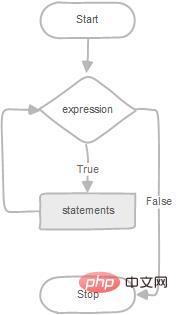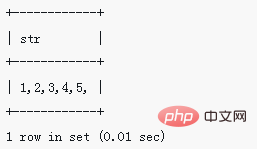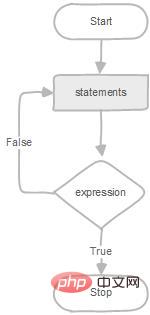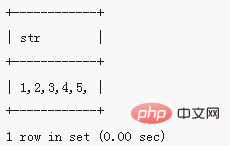What are the loop statements in mysql stored procedures?
There are three types of loop statements in mysql stored procedures: 1. WHILE loop statement, syntax "WHILE conditional expression DO loop statement END WHILE"; 2. REPEAT loop statement, syntax "REPEAT loop statement UNTIL conditional expression END REPEAT"; 3. LOOP loop statement, syntax "[begin_label:] LOOP condition and loop statement list END LOOP [end_label]".

The operating environment of this tutorial: windows7 system, mysql8 version, Dell G3 computer.
MySQL provides loop statements that allow you to repeatedly execute a section of SQL code based on conditions. There are three types of loop statements in MySQL: WHILE, REPEAT and LOOP.
WHILE loop
The syntax of the WHILE statement is as follows:
WHILE expression DO statements END WHILE
WHILE loop check expression in The beginning of each iteration. If expression evaluates to TRUE, MySQL will execute WHILE between evaluations of statements, END WHILE until expressionEvaluated until FALSE. The WHILE loop is called a pretest loop because it checks the expression before statements is executed.
The following flow chart illustrates the WHILE loop statement:

The following is an example of using the WHILE loop statement in a stored procedure:
DELIMITER $$ DROP PROCEDURE IF EXISTS test_mysql_while_loop$$ CREATE PROCEDURE test_mysql_while_loop ( ) BEGIN DECLARE x INT; DECLARE str VARCHAR ( 255 ); SET x = 1; SET str = ''; WHILE x <= 5 DO SET str = CONCAT( str, x, ',' ); SET x = x + 1; END WHILE; SELECT str; END $$ DELIMITER ;
In the stored procedure above test_mysql_while_loop:
First, we construct the string str repeatedly until the value of the x variable is greater than 5.
Then, we use the SELECT statement to display the final string.
Please note that if we do not initialize the x variable, its default value is NULL. Therefore, the condition in the WHILE loop statement will always be TRUE and you will have an infinite loop, which is not desired.
Let’s test the test_mysql_while_loop stored procedure:
CALL test_mysql_while_loop();
Output result:

##REPEAT loop
The syntax of the REPEAT loop statement is as follows:REPEAT statements UNTIL expression END REPEAT
statements, and then evaluates the expression. If expression evaluates to FALSE, MySQL statements is executed repeatedly until expression evaluates to TRUE.
expression checks statements after execution, the REPEAT loop statement is also called a post-test loop.

DELIMITER $$ DROP PROCEDURE IF EXISTS mysql_test_repeat_loop $$ CREATE PROCEDURE mysql_test_repeat_loop ( ) BEGIN DECLARE x INT; DECLARE str VARCHAR ( 255 ); SET x = 1; SET str = ''; REPEAT SET str = CONCAT( str, x, ',' ); SET x = x + 1; UNTIL x > 5 END REPEAT; SELECT str; END $$ DELIMITER ;
CALL mysql_test_repeat_loop();

LOOP, LEAVE and ITERATE statements
Yes Two statements allow you to control the loop:- The LEAVE statement allows you to exit the loop immediately without waiting to check the condition. The LEAVE statement works similarly to the break statement in other languages such as PHP, C/C and Java.
- The ITERATE statement allows you to skip the entire code below it and start a new iteration. The ITERATE statement is similar to the continue statement in PHP, C/C and Java.
DELIMITER $$
DROP PROCEDURE IF EXISTS test_mysql_loop $$
CREATE PROCEDURE test_mysql_loop()
BEGIN
DECLARE x INT;
DECLARE str VARCHAR ( 255 );
SET x = 1;
SET str = '';
loop_label :LOOP
IF x > 10 THEN
LEAVE loop_label;
END IF;
SET x = x + 1;
IF ( x MOD 2 ) THEN
ITERATE loop_label;
ELSE
SET str = CONCAT( str, x, ',' );
END IF;
END LOOP;
SELECT str;
END $$
DELIMITER ;call test_mysql_loop();
- The stored procedure only constructs strings with even numbers, for example, 2, 4 and 6.
- We place a loop_label loop_label before the LOOP statement.
- If the value x is greater than 10, the loop is terminated due to the LEAVE statement.
- If the value of x is odd, the ITERATE statement ignores everything below it and starts a new iteration.
- If the value of x is an even number, the block in the ELSE statement will build a string with an even number.
mysql video tutorial]
The above is the detailed content of What are the loop statements in mysql stored procedures?. For more information, please follow other related articles on the PHP Chinese website!

Hot AI Tools

Undresser.AI Undress
AI-powered app for creating realistic nude photos

AI Clothes Remover
Online AI tool for removing clothes from photos.

Undress AI Tool
Undress images for free

Clothoff.io
AI clothes remover

Video Face Swap
Swap faces in any video effortlessly with our completely free AI face swap tool!

Hot Article

Hot Tools

Notepad++7.3.1
Easy-to-use and free code editor

SublimeText3 Chinese version
Chinese version, very easy to use

Zend Studio 13.0.1
Powerful PHP integrated development environment

Dreamweaver CS6
Visual web development tools

SublimeText3 Mac version
God-level code editing software (SublimeText3)

Hot Topics
 1387
1387
 52
52
 How to open phpmyadmin
Apr 10, 2025 pm 10:51 PM
How to open phpmyadmin
Apr 10, 2025 pm 10:51 PM
You can open phpMyAdmin through the following steps: 1. Log in to the website control panel; 2. Find and click the phpMyAdmin icon; 3. Enter MySQL credentials; 4. Click "Login".
 MySQL: An Introduction to the World's Most Popular Database
Apr 12, 2025 am 12:18 AM
MySQL: An Introduction to the World's Most Popular Database
Apr 12, 2025 am 12:18 AM
MySQL is an open source relational database management system, mainly used to store and retrieve data quickly and reliably. Its working principle includes client requests, query resolution, execution of queries and return results. Examples of usage include creating tables, inserting and querying data, and advanced features such as JOIN operations. Common errors involve SQL syntax, data types, and permissions, and optimization suggestions include the use of indexes, optimized queries, and partitioning of tables.
 How to use single threaded redis
Apr 10, 2025 pm 07:12 PM
How to use single threaded redis
Apr 10, 2025 pm 07:12 PM
Redis uses a single threaded architecture to provide high performance, simplicity, and consistency. It utilizes I/O multiplexing, event loops, non-blocking I/O, and shared memory to improve concurrency, but with limitations of concurrency limitations, single point of failure, and unsuitable for write-intensive workloads.
 MySQL's Place: Databases and Programming
Apr 13, 2025 am 12:18 AM
MySQL's Place: Databases and Programming
Apr 13, 2025 am 12:18 AM
MySQL's position in databases and programming is very important. It is an open source relational database management system that is widely used in various application scenarios. 1) MySQL provides efficient data storage, organization and retrieval functions, supporting Web, mobile and enterprise-level systems. 2) It uses a client-server architecture, supports multiple storage engines and index optimization. 3) Basic usages include creating tables and inserting data, and advanced usages involve multi-table JOINs and complex queries. 4) Frequently asked questions such as SQL syntax errors and performance issues can be debugged through the EXPLAIN command and slow query log. 5) Performance optimization methods include rational use of indexes, optimized query and use of caches. Best practices include using transactions and PreparedStatemen
 Why Use MySQL? Benefits and Advantages
Apr 12, 2025 am 12:17 AM
Why Use MySQL? Benefits and Advantages
Apr 12, 2025 am 12:17 AM
MySQL is chosen for its performance, reliability, ease of use, and community support. 1.MySQL provides efficient data storage and retrieval functions, supporting multiple data types and advanced query operations. 2. Adopt client-server architecture and multiple storage engines to support transaction and query optimization. 3. Easy to use, supports a variety of operating systems and programming languages. 4. Have strong community support and provide rich resources and solutions.
 Monitor Redis Droplet with Redis Exporter Service
Apr 10, 2025 pm 01:36 PM
Monitor Redis Droplet with Redis Exporter Service
Apr 10, 2025 pm 01:36 PM
Effective monitoring of Redis databases is critical to maintaining optimal performance, identifying potential bottlenecks, and ensuring overall system reliability. Redis Exporter Service is a powerful utility designed to monitor Redis databases using Prometheus. This tutorial will guide you through the complete setup and configuration of Redis Exporter Service, ensuring you seamlessly build monitoring solutions. By studying this tutorial, you will achieve fully operational monitoring settings
 How to view sql database error
Apr 10, 2025 pm 12:09 PM
How to view sql database error
Apr 10, 2025 pm 12:09 PM
The methods for viewing SQL database errors are: 1. View error messages directly; 2. Use SHOW ERRORS and SHOW WARNINGS commands; 3. Access the error log; 4. Use error codes to find the cause of the error; 5. Check the database connection and query syntax; 6. Use debugging tools.
 How to connect to the database of apache
Apr 13, 2025 pm 01:03 PM
How to connect to the database of apache
Apr 13, 2025 pm 01:03 PM
Apache connects to a database requires the following steps: Install the database driver. Configure the web.xml file to create a connection pool. Create a JDBC data source and specify the connection settings. Use the JDBC API to access the database from Java code, including getting connections, creating statements, binding parameters, executing queries or updates, and processing results.





